(Strand)om Stories: Doctor Strange: Strange Tales Review
What should be a philosophically fascinating character arc is upended by an overly dramatic narrative which undercuts the tension and transformation
—by Nathan on May 10, 2023—
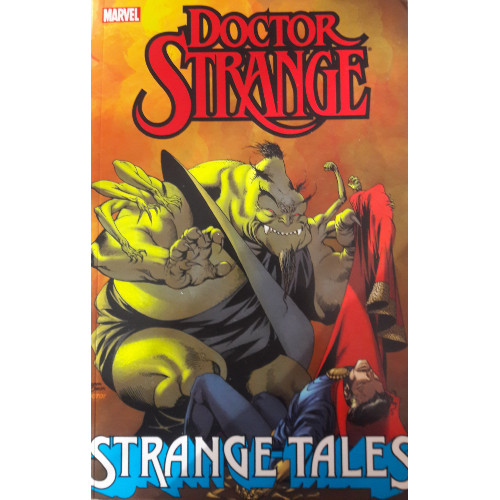
A little over two years ago, I analyzed one half of the anthology title Strange Tales, a 1980s reboot of the series which originally introduced Doctor Strange two decades prior (and showcased some of Jim Starlin’s work on Adam Warlock). Though the good doctor takes up half of each issue, I dedicated that post to scrutinizing the series’ other half, telling tales of the vigilante pair calling themselves Cloak and Dagger.
A while back, somewhere within the last two years, I stumbled across the volume I will be discussing today at a used book store. I don’t know if I recognized the content immediately, but if I didn’t, it quickly became apparent this volume contained the Doctor Strange halves of Strange Tales issues #1-19. I purchased the volume, and though it’s taken me a decent while to finally get around to reading it, I perused it a few weeks back.
So this “(Strand)om Stories” review definitely leans more towards the “random” side of the equation. Yes, I have a somewhat viable link to a previously discussed arc, but time has pushed me a little outside the realms of stronger connectivity. I tend to appreciate creating stronger links between blogs, like reviewing Starlin’s Infinity Gauntlet series right after discussing Thanos’ acquisition of the Infinity Gems or examining a 90s War Machine arc after analyzing Iron Man's appearance in a Spidey story. As often happens, I just read this volume much later than originally anticipated, but particularly because these Master of the Mystic Arts anecdotes of the arcane shared the same issues as the Cloak and Dagger tales, I feel obligated to, at last, share my feelings.
Let us take a flight of fancy together, past that shimmering second star, veering a tad left of a multiverse of madness, and be entranced by a world of magic becoming more heavily tinged with darkness.
Doctor Strange: Strange Tales
Writers: Peter B. Gillis, with Bill Mantlo
Pencilers: Chris Warner, Larry Alexander, Terry Shoemaker, Richard Case, and Dan Lawlis
Inkers: Randy Emberlin and Gerry Talaoc
Colorists: Bob Sharen, Paul Becton, Gregory Wright
Letterers: Jim Novak, Janice Chiang, Ken Lopez, Ken Bruzenak, Pat Brosseau, Bill Oakley, and Gaspar Saladino
Issues Collected: Strange Tales #1-19
Volume Publication Date: October 2011
Issue Publication Dates: April 1987-October 1988
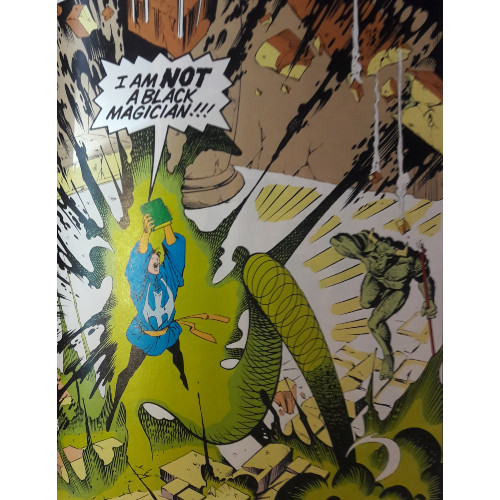
In a Doctor Strange arc preceding this one (which I have not read), our masterful mystic destroyed several powerful relics in order to stop a wicked wizard and save his friends. In doing so, Strange fears he has loosed evils those relics kept at bay. Over the course of the series, Strange becomes more aware of the ramifications of his actions and determines that more drastic steps must be taken in order to rectify those decisions.
I am most familiar with Peter B. Gillis through his 1985-86 Eternals limited series, which was the first Eternals series set in the main Marvel Universe after Jack Kirby’s original incarnation. Paired with Sal Buscema, Gillis took the concept and elevated it to new heights; the series isn’t perfect, but it’s pretty doggone entertaining and does a fairly decent job at thoughtfully probing the complexities of the Eternal/Deviant conflict. Genuine conflict comes from Gillis’ ability to adeptly adapt superhero fare to deeper moral concerns.
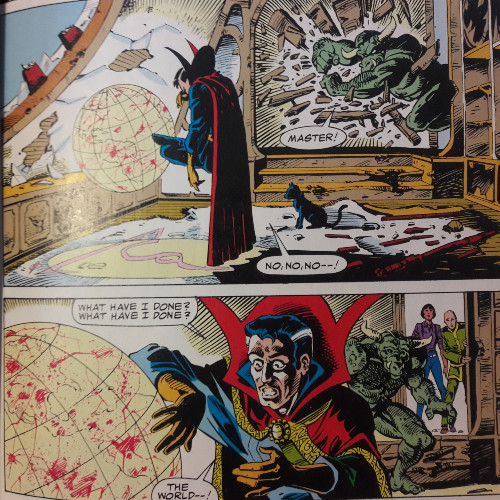
Wistful strands of philosophy similarly tug at the corners of each issue presented in this volume. In general, Doctor Strange certainly gives himself over to musings about the nature of life, power, magic, right and wrong. The only other Doctor Strange narrative I’ve read is Brian K. Vaughan’s The Oath, which expands upon Stan Lee and Steve Ditko’s origin for the mystic marvel, exploring the mind of the surgeon who lost his hands desperately searching for another way to heal.
Thus does Gillis imbue his narrative with great weight. Stephen Strange is a man torn asunder, wracked with the guilt of his seemingly justified actions and stirred to rectify those indiscretions. How do you correct the wrongs born from right action? Temporarily abandoning his current life–to the point where he magically induces his friends to forget him as Stephen Strange and instead believe him a different man–the magician embarks on a whirlwind journey to rectify his error.
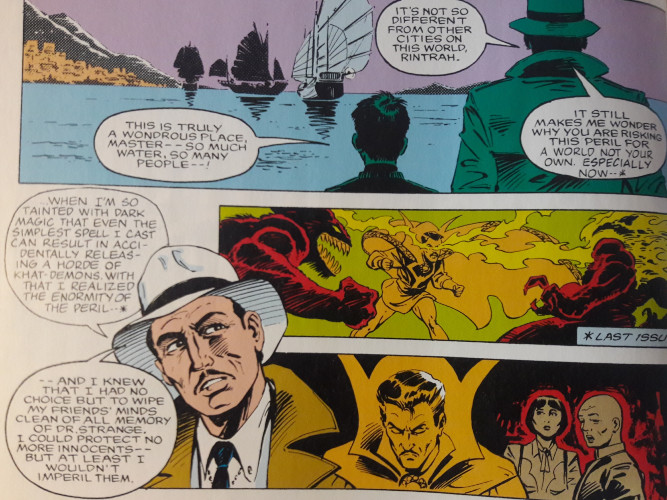
Ever since Stan Lee wrote those immortal words “With great power there must also come great responsibility,” heroes have tangled with that dreaded disease known as a “conscience.” Understanding his quest will cost great sacrifice to himself, Strange travels the globe, seeking foes and allies alike as he discerns how best to stop the evil he unwittingly unleashed.
The journey, I’ll first note, is entertaining enough. Nothing ever occurs in the series to catch you off-guard. Strange faces monsters, demons, and dark magicians; a brief team-up with Cloak and Dagger and a latter version of the Defenders conjures Nightmare as an opponent; spiritual enemies follow physical, as Strange engages with his own continued brokenness as he journeys from location to location. Gillis keeps the series moving at a breakneck pace, giving Strange little time to pause and reflect.
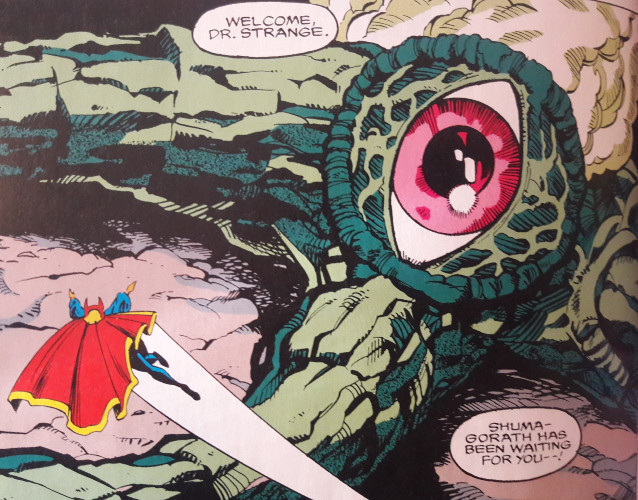
Which leads to Gillis’ greatest strength and greatest folly, haplessly intertwined: the doctor’s characterization. “I am not a black magician!” Strange cries to the skies while exploring Kamar Taj, the site of his apprenticeship to the Ancient One. Strange’s whole journey hinges on his desire to undo the horrible atrocities he unleashed. The concept is strong–this is a tale of redemption, of a man seeking to claw from the pit he fell headlong into. Strange faces the consequences of good intentions, and I approached this tale from that angle…initially.
Gillis, setting up this plot satisfactorily, fails to effectively carry his meaning through. Time and time again, Strange finds himself placed in situations where, seemingly, the only solution is to turn to dark magic. Spurred on largely by Kaluu, an old friend of the Ancient One, Strange routinely behaves counter to his own training–he murders innocents, employs demons, and strips the magic from another enchanter. Each choice brings him deeper into darkness, and even when he’s offered help to turn back, he refuses. There is no way through but forward.
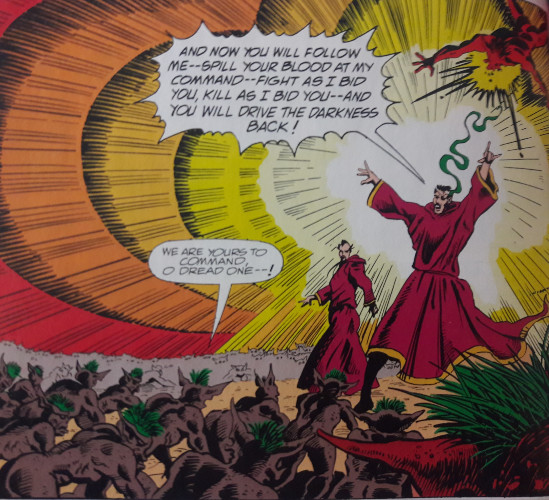
It’s a very frustrating way to read a story. Anytime a writer uses a “there’s no other way” argument, you’re going to have a hard time defending it, particularly when you cast a character into a position where they supposedly have to forsake their own morals for results. You’ve placed yourself, not so much in a corner, but on a path with only one direction, whatever direction you choose. This decision also stunts the possibility of story growth and mallability. Never in this series does Strange encounter any challenge which forces him to reconsider his position, nor does he offer much resistance after initially agreeing to Kaluu’s plan. As I said, you’re never caught-off guard.
What I would have appreciated, in retrospect, would have been a more morally troubled Strange. Gillis’ mustachioed mystic becomes quickly numb to the situation he’s in after accepting Kaluu’s training, as I said, resisting little. Strange offers a single panel of apology to the enchanter whose magic he steals, but this happens at the end of an issue, the next chapter kicking off with him wailing on some demons. He tries to save some folks early on, but these attempts are frustrated by a random death, as if showing Strange how he can’t always save everyone. Gillis seems to have considered each angle or counter-argument readers may have made to a darker Doctor Strange and rebuffs them easily.
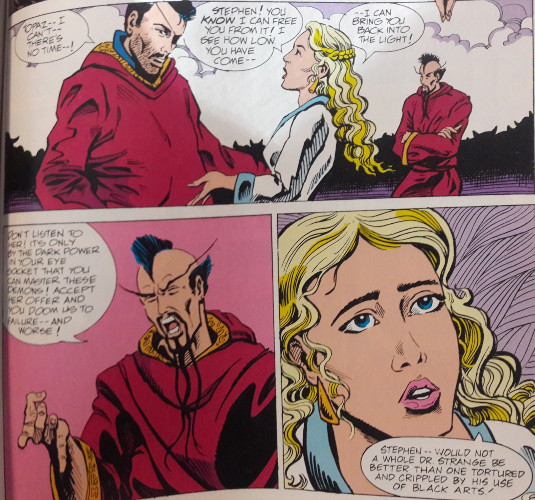
How can you climb up by digging deeper? Are we supposed to be impressed when Strange finally faces his final demon and fully undoes the darkness he originally unleashed? I hoped to feel tension as Strange struggled against this new facet of his personality, and I hoped to empathize when Strange himself faced physical consequences for his actions. I didn’t. Strange’s cries against his present state reverberate weakly when he makes no decision other than following the path he admits he’d rather reject.
As the main story of Strange’s descent into darkness reaches its culmination, Gillis does shift gears a little, offering a four-issue denouement intent on pulling Strange out of the gutter he’s toppled into. Strange comes back from the darkness and works to make amends. These issues are a nice touch, offering levity after all the hard-charging Strange has done for the past several issues. But they pale when compared to the ridiculous single-mindedness (or, perhaps, absent-mindedness) with which Strange doggedly pursued his goal.
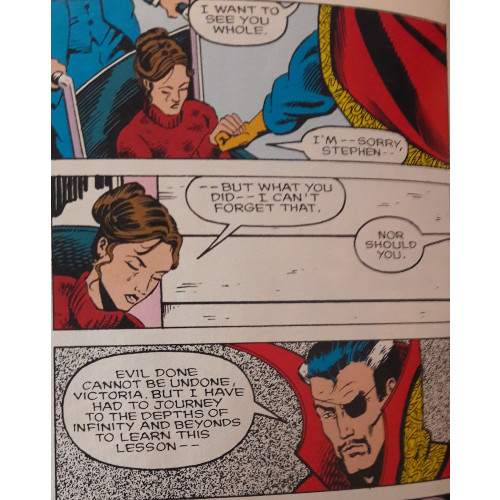
I like my darker heroes. I like heroes who stare down the proverbial barrel of a gun loaded with moral morass and difficult decisions. I like, occasionally, the hero who makes the poor decision, not so we can lambast him but so we can watch him rise from the muck again. This is why a tale such as Peter David’s “The Death of Jean DeWolff” works, because it admits Spidey could go off the rails, violently assault someone if his sense of responsibility gave way to vengeance or personal vindictiveness. But the beauty of David’s story isn’t watching Spidey trounce the Sin-Eater (okay, fine, I’ll admit it is a little satisfying)...it’s when Daredevil pulls the Web-Spinner back to his senses and shows him who he momentarily became. It’s Spidey realizing the consequences of his actions and using that resolve to become better.
I've commented on this elsewhere, but the anecdote feels relevant and worth repetition: last April, in a brief fit of anger, I lashed out at my laptop screen and punched a perfectly picturesque screenshot of Northern Ireland. Green hills shattered, broken in a pixelated spider’s web. And I sat there, aware of my own knee-jerk idiocy. That didn’t lead to a repeated series of violent offenses against inanimate objects. No, it became a lesson, a moment of reflection. I didn’t shrug my shoulders and go, “Gosh, I guess I’m an angry person now” and just accepted it.
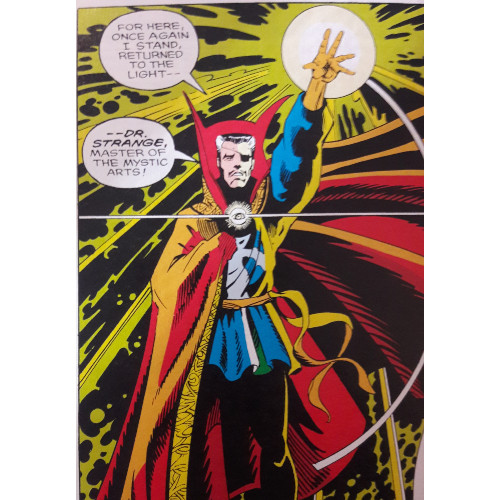
Point being: Gillis’ Strange could, at any moment, step off the path, pull himself back, to impart this “Magic: Wield Responsibly” lesson. Yet the same wizard who shouts he isn’t a black magician at the skies does very little to convince us otherwise. It’s a shame he chooses not to confront who he’s become until late in the story. Gillis would have you believe this morally morose Doctor Strange is a narrative necessity. I object. Perhaps it’s because Strange chooses to embrace darkness to seek redemption, or perhaps it’s because true redemption isn’t found until so late in the series it seems not to bear as much weight…but the premise is undone by the story. I wished to see a Strange who struggled, who made the sacrifices which were necessary (or near to necessary) and refused to compromise the pieces of himself he held dearest. But this Sorcerer Supreme, and his writer, mistake “sacrifice” for “convenience” and end up shadowing far more of Strange than is necessary to make a point about responsibility.